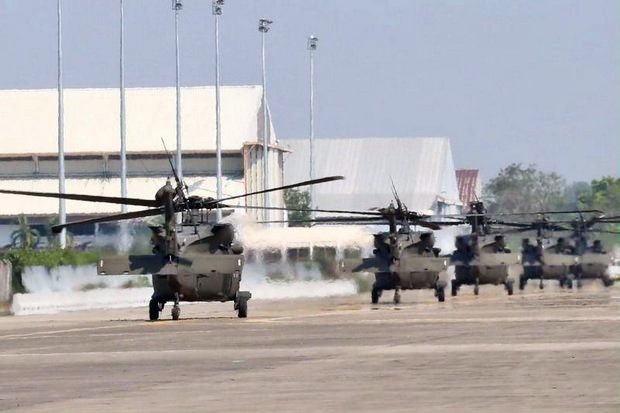
As Cobra Gold, the biggest annual multilateral military exercise in the Asia-Pacific kicks off Tuesday, what the US Pacific Commander Admiral Harry B Harris Jr has to say during his visit to Thailand will be interesting.
Although the exercise is about Thai-US military cooperation, there might be some signals sent about US-Thai relations as a whole.
Admiral Harris is the highest ranking American official to visit Thailand since the military coup in 2014.
On Tuesday, he will meet the Chief of Defence Forces Gen Surapong Suwana-adth, before they launch the 36th Cobra Gold exercise in Sattahip, Chon Buri.
Later he will meet Deputy Prime Minister and Defence Minister Gen Prawit Wongsuwon at the Ministry of Defence before calling on Prime Minister Gen Prayut Chan-o-cha at Government House.
Nobody can be sure what will result from the meetings.
But at least, if cooperation for this year's regional exercise is used as a barometer for Thai-US relations, the atmosphere now is much better than it was two years ago.
Ahead of Cobra Gold 2015, the year after the coup, US Deputy Chief of Mission and Chargé d'affaires in Thailand W Patrick Murphy called for Thailand to return to democracy quickly.
The exercise, held annually since 1982, was not cancelled but the number of Americans taking part dropped from 8,000 to 3,700, and US military assistance of US$3.5 million (122.7 million baht) was cut because Thailand was under a military government.
Last year, US ambassador Glyn T Davies attended the Cobra Gold opening ceremony with the Royal Thai Army Supreme Commander.
Earlier this year, even before the inauguration of US president Donald Trump, the ambassador confirmed the visit of Adm Harris.
At the same time, he insisted that there would be no change in US policy towards Thailand, and the US was happy the government was following its roadmap toward an election.
Up to 29 nations are either taking part or observing the 11-day military exercises in Chon Buri and Nakhon Ratchasima.
There are 8,333 troops involved in the exercise this year and include 4,350 from Thailand, 57 from Singapore, 192 from Japan, 34 from Indonesia, 46 from South Korea, 99 from Malaysia, 13 from India and 14 from China.
This year there will be 3,528 US personnel participating in the various drills, up from 3,300 last year.
Panitan Wattanayagorn, an adviser to Gen Prawit, said the downgrading of the joint exercise and the cut in the military assistance budget was not a result of US policy as such, but the result of a law stipulating the US cannot provide military support for a government resulting from a coup.
It's not yet clear how President Trump will approach Asia or Thailand or whether he will overturn any of the policies of his predecessor Barack Obama -- who emphasised the importance of the region in his Pivot to Asia strategy.
It is clear, though, that he cares more about trade and national security and stability than about human rights and political ideology issues.
Panitan said the US will not want its presence in the region to diminish, especially while the influence of China -- whose economy has steadily grown over the years -- increases.
In this scenario it is important for Thailand to maintain good relations with both super powers.
Inviting China to join the Cobra Gold exercise in 2015, although the People's Liberation Army only joined humanitarian assistance drills, was a good move, he said.
Chulalongkorn University political scientist Surachart Bamrungsuk said Cobra Gold only reflects the state of the military relationship and cannot be used to sound out broader ties.
How US policies turn out, and whether more senior US officials visit Thailand will provide a better overview about how relations between the two nations develop as a whole.
Deputy government spokesman Lt Gen Werachon Sukondhapatipak said he did not want to interpret the situation more broadly beyond the scope of military cooperation which is the heart of these exercises.
So far, it can be seen that the US still sees the importance of Thailand as a strategic partner in the region, he said.
More US personnel and equipment packed on the amphibious transport dock USS Green Bay and the USNS Fisher to be used in the exercise this year was also a good sign.
Lt Gen Werachon said some American soldiers had told him they wanted to understand more about Thailand and its people through community service activities, he said.
This year's exercises focus on support exercises which include a senior leaders' seminar, a field training exercise that includes a variety of training drills to strengthen regional relationships and enhance inter-operability, and humanitarian assistance projects in Thai communities.
It is hoped that through such exercises, Thailand's old ally might find another good way of reviving ties with Bangkok that have soured over the past few years amid Thailand's political problems.